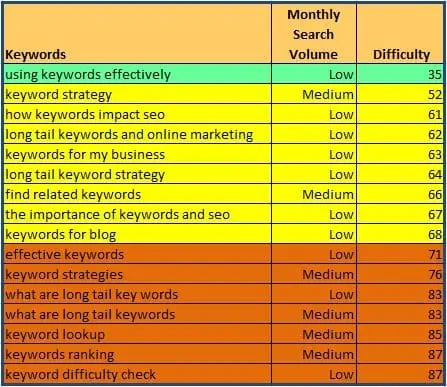Continuing our thread of SEO strategy this week, we look at keyword ranking difficulty. Difficulty score is a measure of how difficult it will be to rank for a given keyword. />
We posted this article at 4am, and by 8am it was #7 on page one of Google’s search results!
Good keywords have low difficulty scores
By choosing keywords that have a low difficulty (easy to rank for) we can get our posts listed on page one of Google more quickly. Why is this important? 78% of people don’t search past page #1 of the search engines for any keyword phrase.
Remember that we are really talking about keywords phrases here. You’ll find that single keywords all hive a high difficulty ranking, meaning that it would be very difficult to rank well for simple-word keywords. Use phrases.
Good keywords are highly relevant to your business
For any keyword you are considering, you should ask yourself, “Is the person who typed this really looking for me?” If you’re a winery in Ohio, and I type “california winery” as my search term, am I looking for you? No. Or if I type “winery” am I looking for you? Unlikely. But if I type “white merlot ohio” and you happen to make a white merlot, I’m looking for YOU!
Low search volume is not a problem
For this reason of relevancy, the total number of searches for a given keyword is not real important. I would rather have the ten people who are looking for “white merlot ohio” than the 1.3 million who are looking for “winery”.
Using keywords effectively
So for this article that you are reading, I started out with a draft title of “SEO Strategy: Keyword Ranking Difficulty”. However, I checked my keywords in Hubspot’s keyword tool and found that this was unlikely to work. Both “seo strategy” and “keyword ranking difficulty” ranked in the 90’s — that is, there is a 90+% chance of NOT ranking well.
Here is the data from my search tool.

Any phrase under a rank of 40 is easy to rank for, and phrases between 40 and 70 are doable. So looking at the data, and being a little creative, I changed the title of this article to “using keywords effectively” (difficulty of 35 – easy!) plus the phrase “keyword ranking difficulty” (difficulty of 94 – virtually impossible). So you can find this article by searching “using keywords effectively” and if you are interested in difficulty rank, the title will entice you to click.
So this article will likely have low traffic, but will attract exactly the people I want!
Now what do I do with my keywords?
Now that you have found keywords for your article that will help you get ranked well in the search engines, here is where to use your keywords:
- in the title of the article
- in the first paragraph of the article
- sprinked very lightly elsewhere in the article where it naturally makes sense
- in the alt tags for images in the article
The bad news about researching keyword difficulty
Today I checked out a dozen free keyword difficulty tools on the web, and found that every one of them was either broken or not returning reliable results. I only tested free tools, that didn’t require a login.
So to really get useful data about keyword difficulty, you need to use either the free Google Adwords tools (login required), or paid tools like Hubspot, SEOmoz, etc.
The takeaway for using keywords effectively
Keyword difficulty is an easy way to assess whether you can rank well for a particular keyword phrase or not. After all, if you’re taking the time end effort to write a blog post, you really DO want people to be able to find it, right?
Whether you’re just getting started with internet marketing or you want to brush up on the basics, this ebook can serve as your essential guide to setting up and implementing a successful internet marketing strategy.




